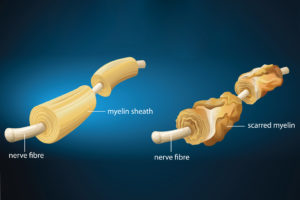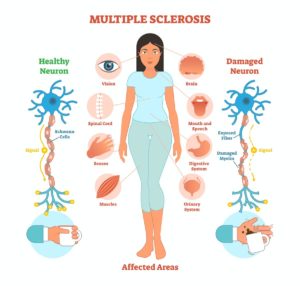
The hallmark of MS is symptomatic episodes that occur months or years apart and affect different anatomic locations.
The cause of MS is not known, but it likely involves a combination of genetic susceptibility and a presumed non-genetic trigger (eg, viral infection, low vitamin D levels) that together result in a self-sustaining autoimmune disorder that leads to recurrent immune attacks on the CNS.
In MS, the immune system attacks the protective sheath (myelin) that covers nerve fibers and causes communication problems between your brain and the rest of your body. Eventually, the disease can cause permanent damage or deterioration of the nerves causing numerous physical and mental symptoms, and often progresses to physical and cognitive disability.

- Sensory loss (ie, paresthesias): Usually an early complaint
- Spinal cord symptoms (motor): Muscle cramping secondary to spasticity
- Spinal cord symptoms (autonomic): Bladder, bowel, and sexual dysfunction
- Cerebellar symptoms: Charcot triad of dysarthria (scanning speech), nystagmus, and intention tremor
- Optic neuritis
- Trigeminal neuralgia: Bilateral facial weakness or trigeminal neuralgia
- Facial myokymia (irregular twitching of the facial muscles): May also be a presenting symptom
- Eye symptoms: Including diplopia on lateral gaze (33% of patients)
- Heat intolerance
- Constitutional symptoms: Especially fatigue (70% of cases) and dizziness
- Pain: Occurs in 30–50% of patients at some point in their illness
- Subjective cognitive difficulties: With regard to attention span, concentration, memory, and judgment
- Depression: A common symptom
- Euphoria: Less common than depression
- Bipolar disorder or frank dementia: May be a late finding but is sometimes found at initial diagnosis
- Symptoms associated with partial acute transverse myelitis
MS is diagnosed on the basis of clinical findings and supporting evidence from ancillary tests. Tests include the following:
- Magnetic resonance imaging: The imaging procedure of choice for confirming MS and monitoring disease progression in the CNS
- Evoked potentials: Used to identify subclinical lesions; results are not specific for MS
- Lumbar puncture: May be useful if MRI is unavailable or MRI findings are nondiagnostic; CSF is evaluated for oligoclonal bands and intrathecal immunoglobulin G (IgG) production
MS is divided into the following categories, principally on the basis of clinical criteria, including the frequency of clinical relapses, time to disease progression, and lesion development on MRI:
Relapsing-remitting MS (RRMS) - Approximately 85% of cases, periods of new symptoms or relapses that develop over days or weeks and usually improve partially or completely. These relapses are followed by quiet periods of disease remission that can last months or even years. Small increases in body temperature can temporarily worsen signs and symptoms of MS, but these aren't considered disease relapses.
Secondary progressive MS (SPMS) - develop a steady progression of symptoms, with or without periods of remission. The worsening of symptoms usually includes problems with mobility and gait. The rate of disease progression varies greatly among people with secondary-progressive MS.
Primary progressive MS (PPMS) - a gradual onset and steady progression of signs and symptoms without any relapses
Progressive-relapsing MS (PRMS) - is the least common type of MS; symptoms vary depending on the area of the brain affected. The condition is characterized by a progressive worsening of the condition from the beginning, similar to primary-progressive multiple sclerosis (PPMS). There are occasional relapse episodes of intensified symptoms similar to those experienced by relapsing-remitting MS (RRMS).
The following 2 subgroups are sometimes included in RRMS:
Clinically isolated syndrome (CIS): A single episode of neurologic symptoms
Benign MS: MS with almost complete remission between relapses and little if any accumulation of physical disability over time
Treatment will depend on your symptoms, age, and general health. It will also depend on how severe the condition is.
Currently, treatments are divided into:
- Disease-modifying treatments. These directly target inflammation in the central nervous system. They help slow its deterioration.
- Treatment of acute relapses. The use of steroids and plasma exchange (PLEX) can speed up your recovery when you have a MS attack.
There is no cure yet for MS. But you can do things to help change the course of the disease, treat flare-ups, manage symptoms, and improve your function and mobility.
Ayurveda Perspective & Management of Multiple Sclerosis

The strength of Ayurveda in treating neurological disorders is globally appreciated. Since it addresses the root cause of the issue the results are fantastic.
CHARAKA offers a very effective treatment methodology for MS, based on the classical texts of Ayurveda. We, at CHARAKA pay top priority to Ayurveda research as it aids the metamorphosis of ancient Ayurveda wisdom for the benefit of the present humanity.
MS treatment primarily consists of four procedures:
- Samsodhan (cleansing through Panchakarma therapy)
- Samsaman (palliative care through researched internal medicines)
- Kaya kalp (rejuvenation)
- Sattvavajaya (counseling/psychotherapy)
Along with these, strict diet & life style modification will be advocated.
We have been continuously working and completely dedicated for the MS research since year 2003. With our deep understanding on MS and its treatment modalities, we were highly successful in treating the patients from different counties.
Early intervention is always fruitful and yields good results varying from recovery to cure. MS becomes incurable after the nerve myelin is lost or damaged beyond the body’s ability to repair it. Then it moves into the category of impossible to cure, but possible to manage.

